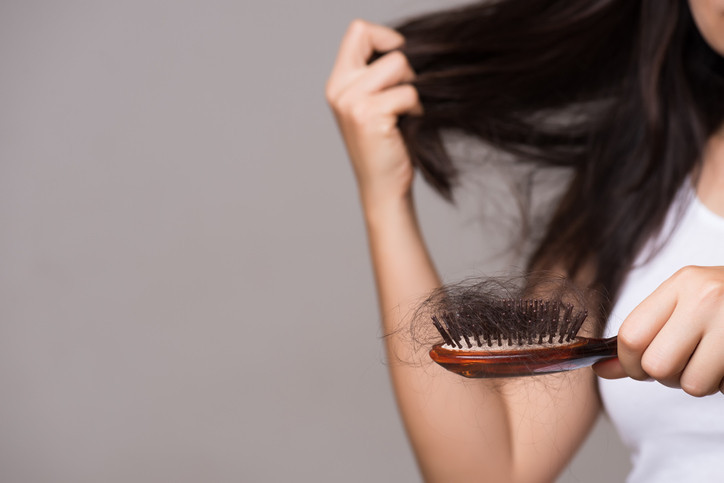Losing hair, whether it’s baldness or thinning strands, can occur due to different reasons. In some cases, it’s a result of a health issue that can improve with proper treatment. Numerous elements, such as genetics, hormones, stress, and poor nutrition, can contribute to the occurrence of hair loss. If you’re experiencing thinning hair loss or baldness, it’s crucial to consult with a dermatologist to identify the cause and find ways to prevent further hair loss or stimulate new growth. Before your appointment, familiarize yourself with common factors that may contribute to hair loss.
1. Hormonal Imbalances
Michele Green, MD, a cosmetic dermatologist in New York City, explains that the main reason for hair loss, like androgenetic alopecia, is excess androgens or male sex hormones, causing hormonal imbalances. Androgens play a role in both male and female pattern baldness.
For female-pattern baldness, androgens can weaken hair follicles, leading to increased hair shedding. Dr. Green notes that androgen sensitivities may worsen during estrogen-related changes, such as birth control use or menopause.
On the other hand, male pattern baldness is linked to an increase in a specific androgen called dihydrotestosterone (DHT). According to hair Specialist, DHT not only binds to hair follicles, preventing hair growth, but it may also reduce the overall lifespan of hair. This condition is also known as androgenetic alopecia.
Medlinelus lists several other medical conditions that can contribute to this type of hair loss, including high blood pressure, heart disease, prostate cancer, and polycystic ovary syndrome (PCOS).
2. Thyroid Problems
Hair loss can be caused by different hormone-related issues. Problems with thyroid hormones, which control various body functions, can lead to hair loss. An underactive thyroid (hypothyroidism) or an overactive thyroid (hyperthyroidism) can create a hormonal imbalance, resulting in hair loss. Conditions like Hashimoto’s thyroiditis and Graves’ disease, which affect the thyroid gland, may also contribute to hair loss. The Cleveland Clinic explains that treating these thyroid issues can help regulate hormones, stop hair loss, and promote hair regrowth.
3. Certain Medications
The American Hair Loss Association says that some medications for common health issues can make you lose hair, known as “drug-induced hair loss.” Medicines like those for thinning blood, birth control, depression, inflammation, and certain heart conditions may cause hair thinning or baldness. Too much vitamin A or drugs with retinoid can also lead to hair loss. Some cancer treatments, like chemotherapy, can make all your hair fall out, but it usually grows back after you stop the treatment.
If a medication is causing hair loss, stopping it might make your hair grow back, just like after chemotherapy. They may switch you to a different drug to see if it helps with hair loss.
4. Various Types of Alopecia Areata (AA)
Alopecia means losing hair, and alopecia areata is a condition where your immune system attacks and destroys hair follicles, stopping new hair growth. Medicine.umich.edu Depending on the type, hair loss can be on the scalp or all over the body. It can lead to thinning hair, patches, bald spots, or total baldness, and it might be permanent or temporary. Genetics can be a cause. Consult your doctor for possible treatments.

5. Other Autoimmune Diseases
Alopecia areata is a type of autoimmune disease that can make you lose hair. There are other diseases like Hashimoto’s thyroiditis and lupus that can also cause hair loss, which this kind of hair loss might not always get better — sometimes it stays permanent. But there are medicines and surgeries to help with the hair loss.
If you have one autoimmune disease, you might get others too. that’s why it’s really important for your doctor to keep a close eye on you for any new symptoms or changes.
6. Physical Trauma
When your body goes through a lot of physical stress, it can mess up the natural cycle of hair growth and rest, leading to hair loss. This could mean your hair gets thinner or even falls out in clumps. Serious things like accidents, surgery, burns, or illnesses can shock your hair follicles, causing up to 50 to 75 percent of your hair to fall out, sometimes months later. This hair loss is called telogen effluvium, and it might get better on its own within six to eight months.
Infections and illnesses can also make you lose hair. A high fever or a bad infection can temporarily lead to hair loss. Skin infections, like fungus, and bacterial infections, like syphilis, can also make your hair thin or fall out.
The good news is that treating the underlying infection can help your hair grow back and prevent more hair loss. So, if you’re facing these issues, the first thing to do is get medical help for the main health problem.
7. Stress
According to Green, intense stress, like facing illness or undergoing surgery, can trigger hair loss. Conditions such as COVID-19 may surprise you, as stress, not the disease itself, is identified as a cause of hair loss by the AAD. Emotional trauma from significant life events, such as divorce, financial problems, or the loss of a loved one, can disrupt the normal hair growth cycle, leading to temporary hair loss. Penn Medicine supports this, explaining that acute telogen effluvium is linked to emotional stress.
Green mentions that after a stressful event, hair loss typically occurs within three to six months.
To promote hair growth, seeking advice from a dermatologist for treatments like minoxidil (Rogaine) or platelet-rich plasma (PRP) office treatments is recommended. These interventions can help stimulate hair growth once stress is under control.

8. Pregnancy
Hair loss can occur due to hormonal imbalances, especially after pregnancy and childbirth when hormones fluctuate. This is known as postpartum hair loss, affecting 40 to 50 percent of new mothers. During pregnancy, high estrogen levels temporarily reduce normal hair loss.
After childbirth, as estrogen levels return to normal, you may experience more hair loss than usual. Thinning hair or bald patches are also common, typically occurring one to six months after giving birth and lasting up to 18 months. This excess shedding is noticeable along the hairline, especially in women with long hair.
The good news is that postpartum hair loss is temporary. Hair follicles will recover as your body heals. Although you can’t completely prevent it, you can minimize the issue by being gentle with your hair and continuing to take prenatal vitamins.
9. Trichotillomania
Stress can lead to short-term hair loss, but severe stress or anxiety may be linked to a condition called trichotillomania, where people compulsively pull out their hair. This disorder is associated with obsessive-compulsive disorder and other anxiety disorders. Symptoms include finding relief or pleasure after pulling out hair and noticeable patches of hair loss.
Trichotillomania usually develops between the ages of 10 and 13 and can persist as a chronic issue. Mayo Clinic Treatment options include cognitive behavioral therapy and habit reversal training, which help you become more aware of the urge to pull your hair and develop alternative coping strategies. While there are no specific medications approved for trichotillomania, certain antidepressants or antipsychotics may be beneficial. If you suspect you have this condition, seek professional help for appropriate treatment.
10. Nutrient Deficiencies
Green explains that deficiencies in certain vitamins and minerals can lead to hair loss and reduced hair growth since they play a crucial role in the hair growth cycle and cellular turnover.
The example of vitamin deficiencies, such as insufficient protein, biotin, zinc, and iron, which can contribute to hair loss. To maintain overall health, it’s essential to obtain necessary vitamins and nutrients, including protein, through a diverse and well-balanced diet. Poor nutrition or extreme crash diets can lead to nutrient deficiencies, resulting in various forms of hair loss.
Before resorting to over-the-counter supplements for potential deficiencies, it’s advisable to consult with a doctor and undergo lab testing to confirm any nutrient deficiencies. This step helps prevent overdosing. Research, like a study from January 2017 in Dermatology Practical and Conceptual, doesn’t support the use of dietary supplements for individuals without nutritional deficiencies.
Green suggests including foods like fatty fish, berries, and leafy greens in your diet to promote healthy hair growth. However, she emphasizes that even with a healthy diet; genetic factors can still contribute to hair loss, despite preventive measures. Before taking any supplements, it’s crucial to consult with a doctor.

11. Extreme Hair Care
To keep your hair healthy and avoid damage, choose shampoos and conditioners that are gentle and suitable for your hair type. Creating a fashionable hairstyle can lead to significant damage, breakage, and even hair loss. Excessive shampooing, frequent blow-drying, and using heated styling tools too often can contribute to hair problems. Additionally, pulling on your hair, especially when blow-drying or styling it tightly and vigorous scalp rubbing can also cause hair loss. Damage-induced hair loss may be worsened by perms, relaxers, and hair dyes. So, it’s essential to be mindful of your hair care routine to maintain healthy and vibrant hair.

